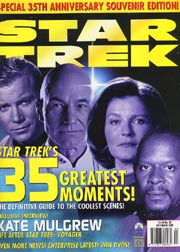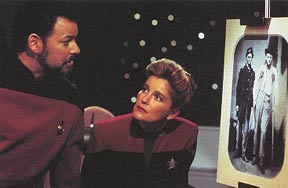|
 |
|
 |
|
|
|
|
 Yes,
there is life after Star Trek. That’s the great discovery Kate Mulgrew
has made, and she’s relishing every millisecond of it. Not that life after
Star Trek is exactly relaxing “Strangely enough, my life is even more full
than it was before, “Mulgrew says during a rare day at home, a day that
follows a raucous birthday party for one of her sons and precedes a two-week
family getaway. “I think I’m making up for lost time. Yes,
there is life after Star Trek. That’s the great discovery Kate Mulgrew
has made, and she’s relishing every millisecond of it. Not that life after
Star Trek is exactly relaxing “Strangely enough, my life is even more full
than it was before, “Mulgrew says during a rare day at home, a day that
follows a raucous birthday party for one of her sons and precedes a two-week
family getaway. “I think I’m making up for lost time.
“What’s strange to me is that before, I at least had a very rigid structure to my schedule, “she continues. “I knew that I had to be at the studio every day, that I needed to deal with certain promotional responsibilities and that I had to make time for my family as well. Now it’s kind of a free-for-all – kind of a free-fall free-for-fall, I would say. There’s just so much to do. I’m all over the place.
“With all of that going on it’s been quite a breathless period,”she emphasises. “And it’s funny, because I’m getting itchy to work. I would say that the rumblings are already asserting themselves. We’ll do a reading of the play in the summer, but I’m looking at January as the time when I really get back into work, when I really get back into the theatre. I must say that I went into a Broadway play while I was in New York just recently and it was quite daunting. I’m a bit nervous and musty, but also very excited. If something delicious were to come along before January, of course I’d consider it very carefully and seriously, but I think my family and my husband’s political asperations are the priority right now.”
“I don’t miss it yet, “says the actress, who had dinner with Roxann Dawson when they both attended a recent convention, exchanged phone calls with Robert Duncan McNeill and hoped to see Ethan Phillips in the Los Angeles production of the stage show Side Man (which was directed by Star Trek: Deep Space Nine alumnus Andrew Robinson). “I’m a little surprised, but I’ve just been so busy and so immersed in the lives of the people that I’ve missed for so long that I’ve really not had much time to think about Voyager. “I do run into people all the time who tell me that they miss Captain Janeway and miss the show, “ she comments. “It happens all the time. And they are full of wonderful accolades. It makes me feel that Voyager has really been enjoyed and supported by a certain fraction of the television audience. “I have to tell you that it’s interesting, getting noticed on the street, having people come up to me to talk about Star Trek. I don’t think of myself as a celebrity. I don’t think of myself as Captain Janeway. I think of myself as Kate Mulgrew. I think of myself as a person. Because we did reach only that faction of the television audience. I enjoy a kind of anonymity and peace that I quite like, to tell you the truth. It’s nice to be recognized and it’s also nice to not be recognized too much. “
“I saw the finale,” Mulgrew notes. “I watched it on television with my husband and my stepdaughters the night it aired. I was very moved and I understood that night that I was having a cathartic moment. I had tears and all that because I realised that I was saying goodbye for the first time in a genuine and emotional way. “So my viewing of the finale was colored by that every time somebody came on the screen. I was experiencing the realisation that I wouldn’t see Tim (Russ – Tuvok) and Robbie (McNeill) and Bob (Picardo-the Doctor) again for a while and possibly forever. This a very fickle business and when a show ends, people scatter to the far ends of the earth. At the same time I liked Endgame and was very proud of it.
“I understand that there may have been some feeling of anti-climax at the very end, but I loved the simplicity of it. That’s how we began seven years ago and I thought pretty strongly that that’s how we should end. [Spoiler Alert] We knew they had to get home one way or another, so why doll it up? It was pretty big as it was, right? Some people may have wanted a big Voyager gets home scene with fireworks and confetti, but I didn’t think that would have been right considering that we’d experienced for seven years, I thought the ending was very fitting. It was not only fitting, but also smart. This is life. This is science fiction. And the finale was true to the spirits of both life and science fiction.” The finale also gave Mulgrew a rare opportunity to see herself as she might look about 30 years from now, to act and to speak as she may act and speak three decades hence. “I was very moved by Admiral and, though this may sound a little odd, I could distance myself from her in such a way as to admire her performance, whereas I’m very critical of the captain. I had no such feelings about the admiral. There was a real abandon and confidence in her that I had and really enjoyed.”
“I wouldn’t give any advice to the cast,” she decides. “I especially feel that I don’t have to give any advice to Scott Bakula. He obviously knows this game better than I do. He drove a hard bargain with the studio, he knows what he wanted and he’s a veteran. Plus, he’d done a sci-fi show (Quantum Leap) before. So he knows what he’s doing. I just wish them all luck. As the conversation draws to a close, Mulgrew jumps through time and space to point out the best of Captain Janeway. That is to say that the actress obliges a request to guide viewers – long time fans and newcomers as well – to those episodes that she feels most represent either the character’s finest moments and/or her own best bits of performance. ‘I’d say the pilot, Caretaker, then also Death
Wish, Counterpoint and the finale, “she offers. “I could also put Workforce,
Part I and II in there too, because I thought those were excellent episodes
and very important for Janeway, but I won’t.
“Counterpoint was a theatrical dance the likes of which one seldom sees in science fiction. I was utterly at ease, and experienced that episode with great pleasure from beginning to end as an actress.” “The pilot started it all and the finale embraced everything, “she says finally. “I can see the through-line between the pilot and the finale. She was the same woman, but more mature and more experienced by the finale. She survived life’s hard earned lessons, and that’s why I think it was so moving. Janeway never lost her heart.” |
|
|
 |